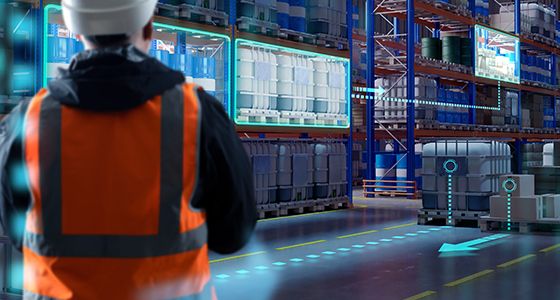Do you ever feel like something is missing in your industrial drum packaging system? Could your components be more cost effective? Is the closure user-friendly? How are new compliance measures and regulations affecting your system? Are there packaging alternatives that can help your company achieve its latest corporate social responsibility (CSR) goals, like reconditioned drums?
Drums are one of the most popular and versatile packaging selections across almost every industry. As a result, they also come in a wide variety of sizes, materials, configurations, and more. In this article, we’ll explore these considerations and others to help you determine whether new or reconditioned drums are a better choice for your operation and its goals.
New drums bring consistency and durability

There are several distinct advantages to purchasing new steel and HDPE drums. The primary reasons for new drum demand are quality, consistency, and packaging performance. These packaging solutions are freshly crafted without any surface deformities, dents, or material impurities. New drums can shield and store products with peak structural integrity, durability, chemical resistance, and more.
The other benefit to selecting new rather than reconditioned drums is the level of customization. You can order industrial drum packaging that meets your exact specifications. Similarly, you can even choose between drums with varying wall thicknesses to attain the same durability at a potentially lower price.
Other customizable characteristics include the closure style, whether you need a tight head or open head. The design flexibility of new drums can also add to the aesthetic appeal because there are multiple color options for both steel and HDPE drums.
Unlike reconditioned drums, new drums are considered more valuable for their ability to store hazardous products. Virgin materials offer the highest degree of purity for safely containing certain sensitive, volatile, and hazardous solutions.
An account manager at Pipeline Packaging since 1994, Bo Patterson specializes in helping customers navigate questions about hazardous packaging.
“Some industries don’t want to run the risk of using reconditioned drums,” said Patterson. “Pharmaceuticals, food and beverage, and even certain cases in oil and gas will usually prefer the dependability of new drums over reconditioned varieties.”
Reconditioned drums offer a green, cost-effective alternative
If you’re looking to harness the benefits of drum packaging at a lower cost to your budget or the environment, then you may want to consider reconditioned drums. Also available in poly or steel varieties, these drums are repurposed after at least one application.
Before arriving to your assembly line or warehouse floor though, these containers undergo a rigorous cleansing process that involves strong chemical agents to remove residues and can even involve surface repairs for dents. The result leaves you with packaging that’s ready to serve a new purpose.
Even with thorough restorative efforts though, reconditioned drums have their limitations. For example, a new drum will always have a higher UN rating than its repurposed alternative, meaning many customers dealing in hazardous materials can only use new varieties. Other industries like pharmaceuticals and food and beverage are among those which also prefer virgin materials.
Still, many customers select reconditioned drums as a cost-saving measure. Though in recent years, the supply of these repurposed packaging options has decreased due to an increase in regulations and market shifts, they remain a tactful way for operations to cut costs.
“We have customers in the food and beverage industry who will use reconditioned drums to transport fruit and tomato juices to their processing plants,” said Patterson. “After processing, the finished juices are stored in brand new drums to maintain a clean product for consumers.”
This creative strategy of using reconditioned packaging as a transportation or storage option allows some customers to secure significant cost savings while also fulfilling safety and compliance measures.
Account manager Randy Allison joined the Pipeline Packaging team in January 2020. He shared more insight about repurposed drums and their advantages.
“Reconditioned drums are a staple solution in the environmental sphere,” said Allison. “They are particularly popular for natural disaster and environmental cleanups. In some cases, customers will even use them for hazardous waste cleanups, and once the job is done, they’ll immediately incinerate the materials with the container.”
He also added how some customers find reconditioned drums suitable for storing objects like nuts and bolts.
Meet your 2025 CSR goals using new and reconditioned drums
Their popularity in the environmental industry brings us to the primary advantage behind reconditioned drums — sustainability. Over the last decade, the concept of greener packaging solutions has continued to gain momentum, leading many companies to look for ways to meet their corporate social responsibility initiatives. Reconditioned drums offer a sustainable alternative to achieving high-volume, durable storage while reducing your overall impact on the environment.
Though reconditioned drums may seem like the only route for achieving eco-friendly solutions, there are also ways you can contribute to your CSR goals while using new drums as well. After using them for your operational needs, you can recycle drums by sending them to a reconditioning plant. There, the packaging solutions can undergo the necessary purifications that will allow them to be reused.
To maximize your CSR performance, there are a couple things to keep in mind before sending drums through the recycling process.
“Drums, especially the steel varieties, require the proper RCRA compliance and SDS sheets to undergo the recycling process,” said Allison. “In addition, the packaging must be empty. Even one to two inches of residue in a single drum is enough for the entire shipment to be rejected by a reprocessing center.”
This scenario is one of many considerations to keep in mind if you’re trying to maximize your sustainability by creating more reconditioned drums. Even the slightest safety or compliance concern, like leftover residue, can impact your attempts to run a clean operation.
Pipeline Packaging brings the resources and responsibility
As packaging experts, we walk alongside customers to find the packaging solution that fulfills your specific needs. And finding the right packaging solution for you is more than selecting all the necessary components.
In some cases, it’s simply a matter of choosing between steel, plastic, and fiber options. For others, it’s determining what packaging may be excessive. In these instances, our team will help you navigate more efficient options down to minute details like the different wall thicknesses available in our drum inventory. Even company objectives like your CSR commitments play a vital role in the way we consider alternative packaging options like reconditioned drums.
Pipeline Packaging’s southwest regional sales manager for nearly a decade, Mike Watson offered some insights into our commitment to the customers we serve.
“At Pipeline, we never over-promise and underproduce,” said Watson. “We leverage our distributor’s advantage, cutting-edge technology, and the expertise of our entire team to ensure customers have their desired packaging, whether reconditioned drums or aluminum cans when they need it.”
Pipeline Packaging takes personal responsibility in finding the perfect fit for every customer using pragmatic counsel and an inventory that offers the breadth of choice. Our selection of value-added services works in tandem with our expertise to provide packaging logistics, warehousing, labeling, and more that puts your operation at ease. Contact us today to learn if your operation would benefit from implementing new or reconditioned drums.


